“For the World is Hollow and I Have Touched the Sky”
Written by Rik Vollaerts
Directed by Tony Leader
Season 3, Episode 10
Production episode 60043-65
Original air date: November 8, 1968
Stardate: 5476.3
Captain’s log. The Enterprise is fired upon by a spread of old-fashioned missiles. Kirk orders Sulu to blow them up with phasers, and then Chekov traces their course back to an asteroid, toward which the Enterprise heads at warp three.
While the ship is en route, McCoy announces the results of the crew’s annual physicals: everyone’s in great shape except for McCoy himself, who has xenopolycythemia, a terminal illness for which there is no cure.
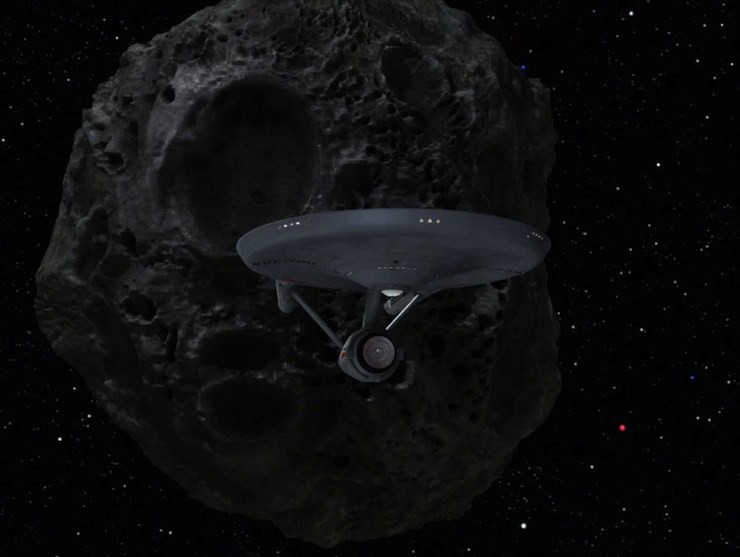
The Enterprise arrives at the asteroid, which is pursuing a course through the solar system under its own power. Spock detects an independent inner core with a breathable atmosphere, though he’s detecting no life signs. The ship is over 10,000 years old.
The ship is also on a collision course with an inhabited planet. Luckily, it’ll take more than a year to hit it, so they’ve got a bit of leisure time. Kirk, Spock, and McCoy beam over—though Kirk intended for it to be only him and Spock, McCoy insists on going along also.
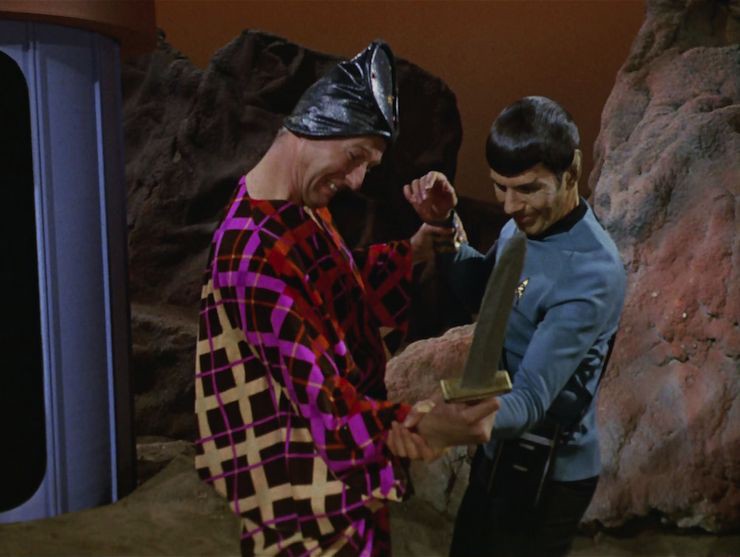
Despite detecting no life signs, the landing party is ambushed by sword-wielders, led by a woman named Natira, who is the high priestess of the people of Yonada. The landing party are taken underground, where there are lots more people, so the catacombs must be shielded from sensors somehow. Natira takes them to an altar before which she kneels, and the landing party is forced to do likewise. She prays to the Oracle for guidance.
McCoy also notes that she called this the “world” of Yonada, and he and Kirk hypothesize that they may not know they’re on a ship.
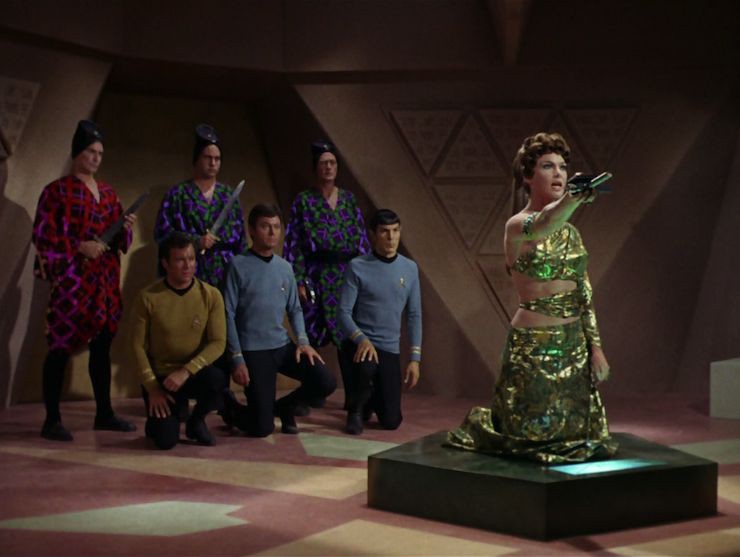
Kirk says they come in friendship, and that’s when the Oracle speaks: he wants them to learn what it is to be an enemy before becoming a friend and zaps them with a beam of electricity that renders them unconscious. Nice guy, the Oracle…
They wake up in a room on comfy beds. McCoy takes longer to regain consciousness, and Kirk tells Spock about McCoy’s condition, which irritates McCoy when he wakes up.
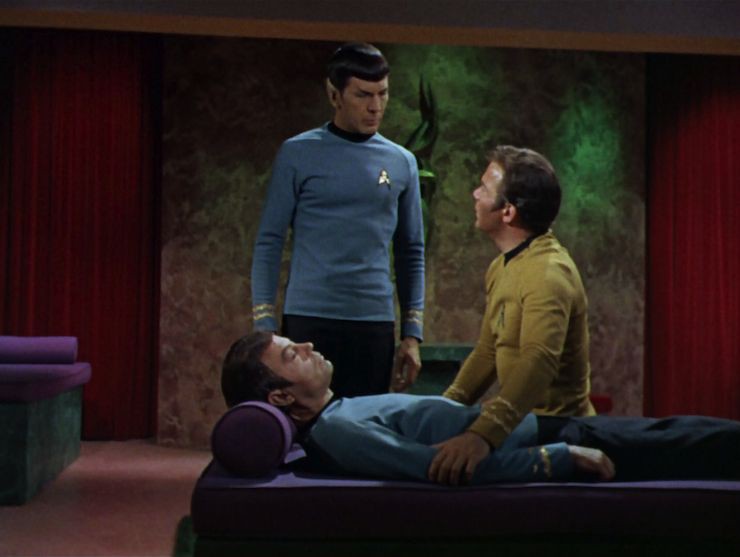
An old man comes in and gives them pills to make them feel better. He confides that he once climbed a mountain, even though it is forbidden, and actually touched the sky. As he speaks, he feels tremendous pain, and dies. McCoy notes a subcutaneous implant at his temple. His story makes it clear that the people are deliberately being kept in the dark about the nature of their world.
Natira and two priestesses arrive with food and drink for the prisoners, and Natira also kneels and intones a prayer for the old man, including a mention that those who speak ill are punished.
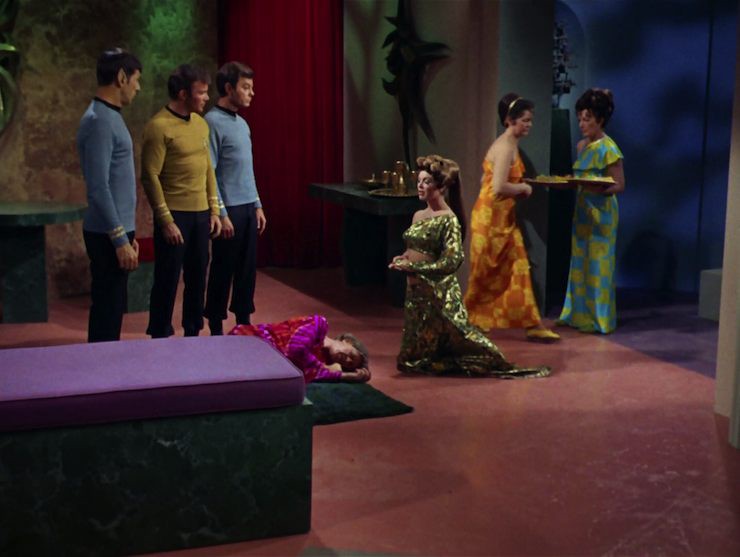
Natira also expresses an interest in McCoy’s health, and announces that the Oracle has now decided that they are to be treated as honored guests. Kirk notices Natira’s interest in McCoy, teasing him a bit about her poor taste in men, and encourages McCoy to occupy Natira’s attention while Kirk and Spock look around. Natira actually encourages this as well, as they are now indeed honored guests and can have free rein of Yonada and speak to the people.
McCoy asks about the old man, and Natira explains that the Oracle knows everything they do, say, and think. Natira also expresses romantic interest in McCoy, which he returns—though she goes a step further and proposes marriage (or the Yonadan equivalent, anyhow). In the interests of full disclosure, McCoy explains that he’s only got a year to live, which won’t make for much of a relationship. However, Natira would prefer a year of McCoy over nothing with him, so she’s down with it.
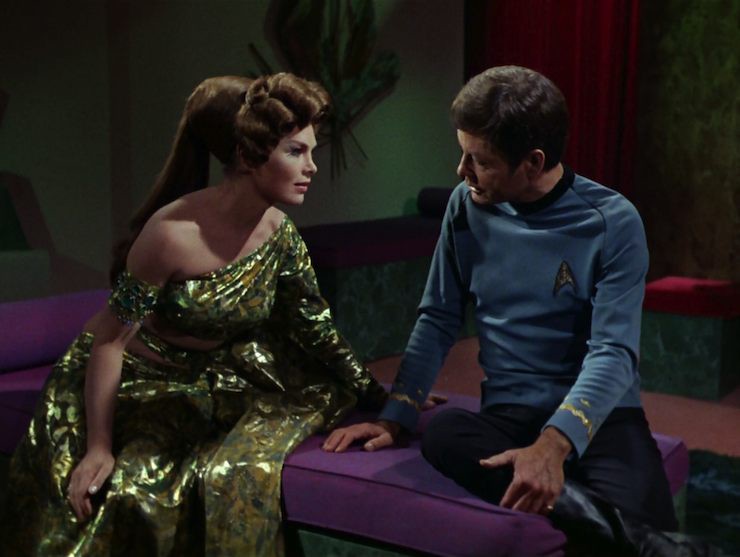
Kirk and Spock wander the corridors, getting stared at by the locals, and musing about the world. They arrive at the door to the Oracle’s altar, but it’s locked. Spock recognizes the writing as Fabrini, a civilization that was believed destroyed in a supernova. It’s possible that these are the last of the Fabrini, en route to a new world.
Spock gets the door open and they look around. The Oracle seems dormant—it was probably activated by Natira kneeling on a platform—and the writing in the room seems to confirm their idea that these are the Fabrini.
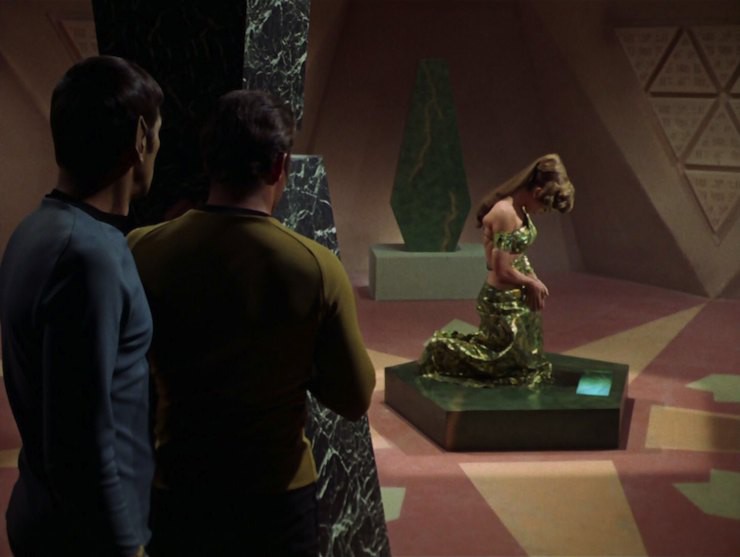
Natira comes in, and Kirk and Spock hide behind a monolith. She kneels and asks the Oracle for permission to take McCoy as her mate. The Oracle will only agree if he becomes one of the people. (Just like any mixed marriage, sometimes you have to convert to make it work…)
However, the Oracle now detects Kirk and Spock and zaps them. This is sacrilege and they are to be punished with death. McCoy pleads with her to let them return to the Enterprise. In exchange, he’ll stay with her and become her mate. He couldn’t be happy with her if he knew she ordered his friends to their death. So Natira agrees.
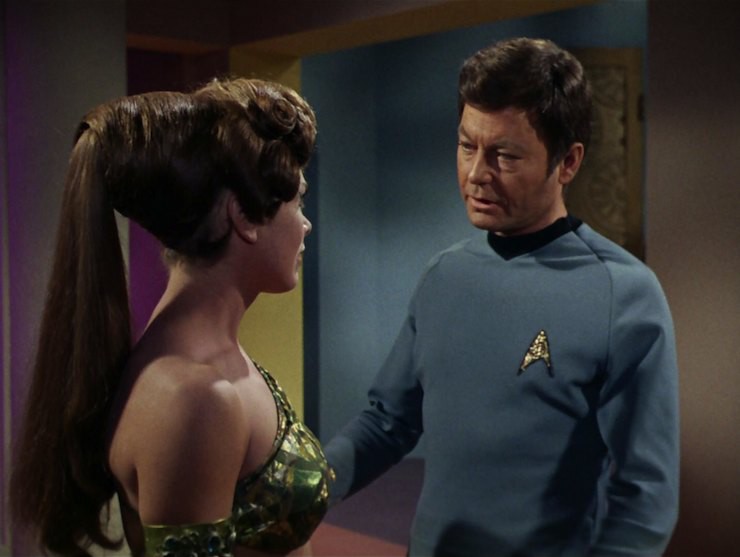
Kirk tries to order McCoy to beam back with them, which he refuses. For some reason, McCoy doesn’t mention the part about how he got their death sentences commuted.
The two beam back and start working on how to divert Yonada’s course so that it doesn’t crash into an inhabited world.
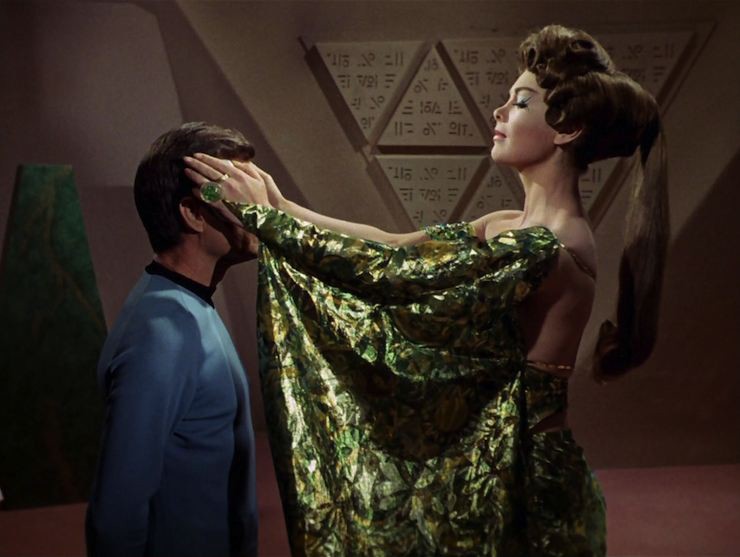
McCoy agrees to have the instrument of obedience (the subcutaneous implant) placed within him. Then they are officially mated before the Oracle in what is actually a very sweet ceremony. She then shows McCoy the book that is to be opened when they reach their new home. Nobody has opened the book in living memory, and Natira refuses to until the appointed time.
The Enterprise has failed to alter Yonada’s course. Admiral Westervliet orders Kirk to move on and let Starfleet Command deal with it. However, McCoy then contacts the ship to tell them about the book—but in mid-sentence he screams and collapses. The subcutaneous implant is punishing him.
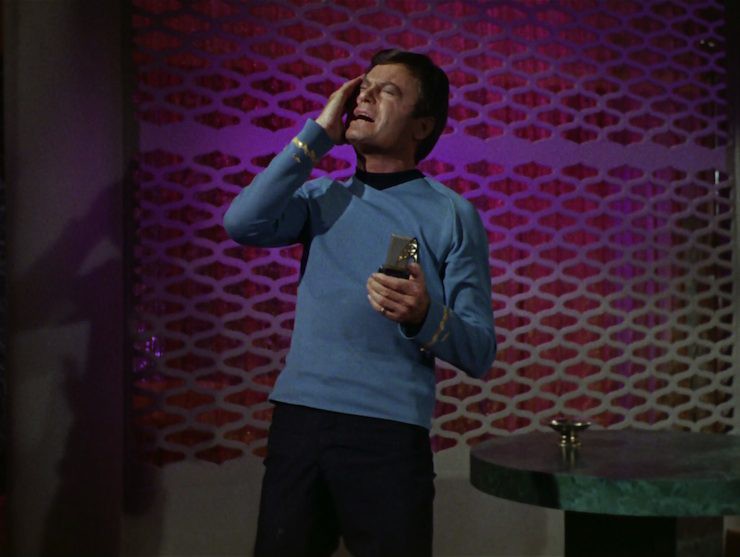
Kirk and Spock immediately beam over to find out what’s wrong. Spock removes the implant, and only then does McCoy regain consciousness. Natira says she’s forced him to violate his vow of obedience, but Kirk says he’s granted him freedom from the Oracle’s oppression.
Having nothing to lose, Kirk tries to explain the truth to Natira, who is skeptical to say the least. However, as Kirk speaks the truth to her, her own implant starts to activate which, if nothing else, proves him right. But she insists that he’s lying, that this is a planet not a ship, and she runs away to the Oracle.
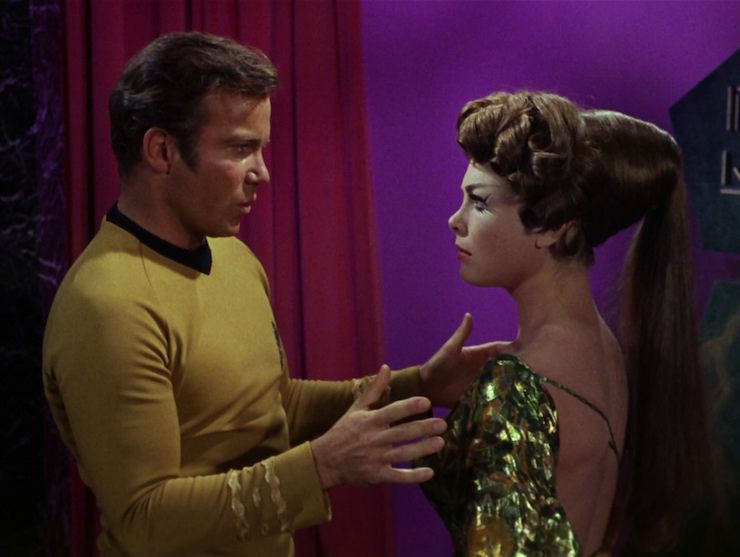
Once McCoy’s recovered, they follow Natira to the altar, where she’s collapsed. She realizes that the Oracle has kept them in the dark on purpose. McCoy removes her implant and tells Kirk and Spock to retrieve the book from the monolith.
The Oracle is kinda peeved at this notion and superheats the room, but Kirk and Spock retrieve the book anyhow, which tells them how to access the control chamber. Spock neutralizes the heating elements, and then they are able to repair Yonada’s engine and put the ship back on course.
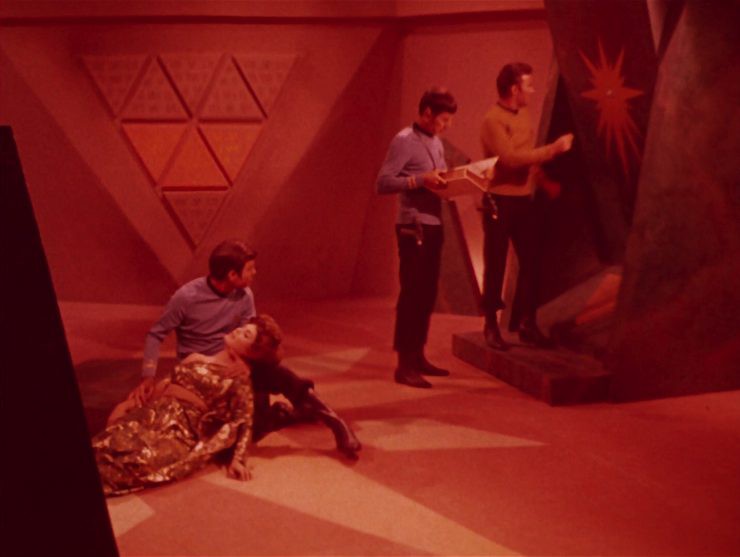
McCoy wishes to continue to travel the galaxy to try to find a cure for xenopolycythemia, and wishes Natira to come with him. But Natira cannot abandon her people. She frees him from his vow to stay with her, and asks only that, should he find that cure, he come back to Yonada.
And then Spock finds something cool: the entire database of Fabrini knowledge, including a considerable amount of medical knowledge, like the cure to xenopolycythemia. It’s a Christmas miracle! Kirk promises to make sure the Enterprise is nearby when Yonada reaches its intended destination in a year.
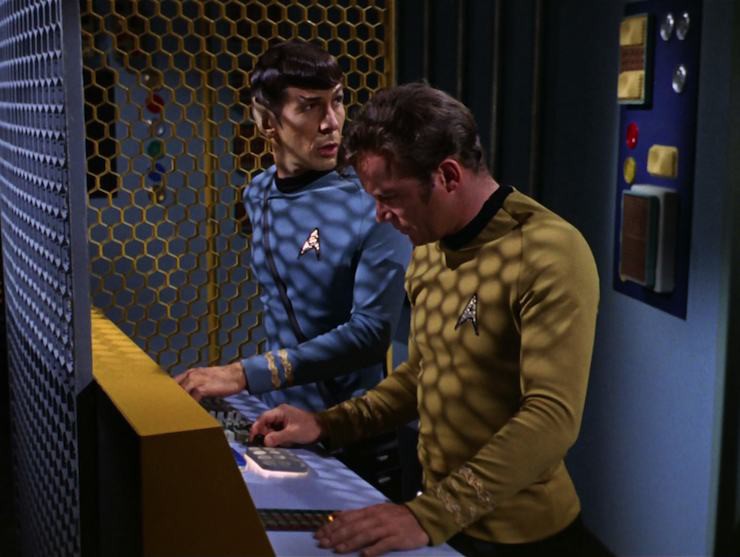
Can’t we just reverse the polarity? Yonada is off course because it never occurred to the builders of this super-awesome asteroid/ship that the engines might need maintenance over the course of ten millennia.
Fascinating. The moment when McCoy wakes up and Spock puts a hand on the doctor’s shoulder is a masterpiece of subtle acting, as Leonard Nimoy’s facial expression doesn’t significantly change from its usual I-am-in-control-of-my-emotions bland affect, but you can see the respect, the concern, the friendship.
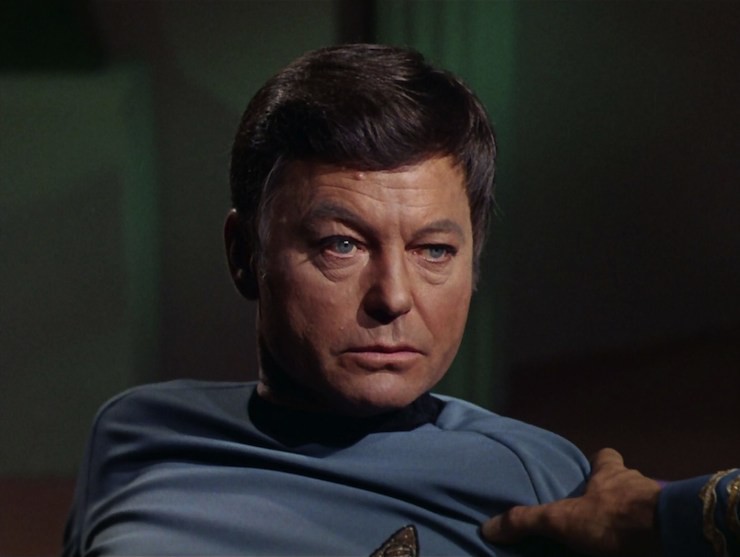
I’m a doctor not an escalator. McCoy typically avoids drawing any attention to himself or his illness. Chapel has to do an end-run around the doctor and call Kirk to sickbay for an emergency, which is the only reason why McCoy even tells Kirk, and he swears both nurse and captain to secrecy, though Kirk does later tell Spock.
Ahead warp one, aye. Sulu blows up the missiles. Because he’s just that awesome.
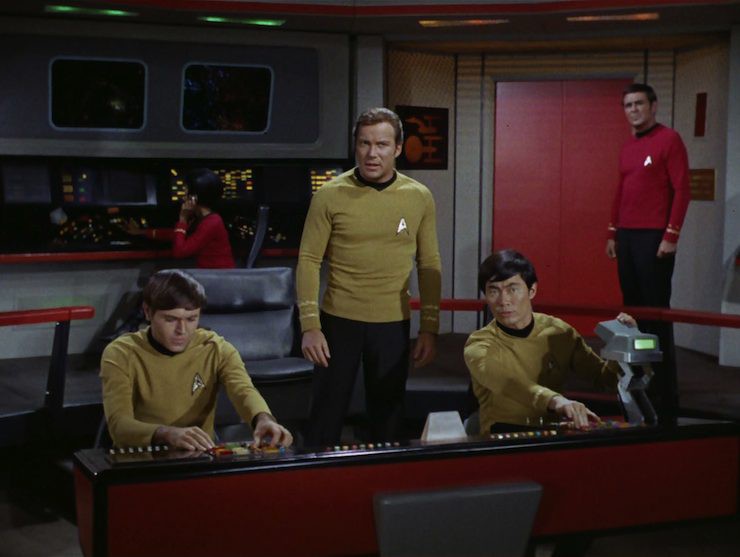
It is a Russian invention. Chekov plots the missiles’ course back to Yonada. Because he’s just that awesome.
Hailing frequencies open. Uhura, um, does communications stuff, I guess.
I cannot change the laws of physics! Scotty, um, does engineering stuff. Well, actually, no he doesn’t even do that. He gets to be in command of the ship a lot, so he answers the phone when Kirk calls, but, um, yeah.
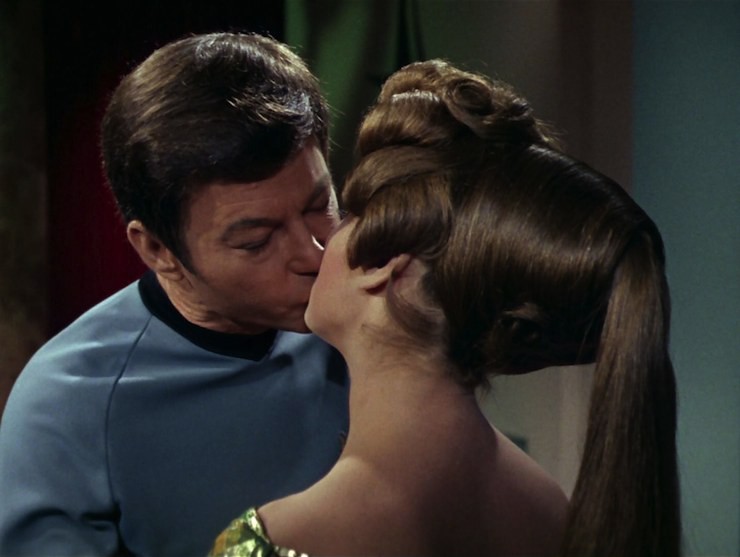
No sex, please, we’re Starfleet. It’s love at first sight for both Natira and McCoy. Even McCoy is taken aback when Natira goes from, “Hey, you’re kinda cute” to “Let’s get married” in about twenty-five seconds, but he eventually goes along, figuring he should spend his last year alive being happy.
Channel open. “But things are not as they teach us. For the world is hollow, and I have touched the sky.”
The old man discussing the results of his mountain-climbing trip. You know, that would make a dandy title…
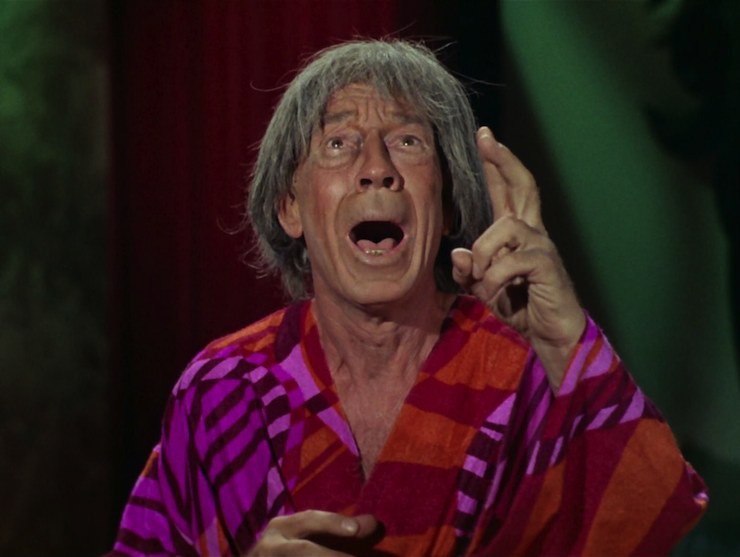
Welcome aboard. Jon Lormer makes his third appearance on Trek, having appeared twice in the first season, in “The Cage” (and again in “The Menagerie“) as an illusory survivor of the Columbia and in “The Return of the Archons” as Tamar. Byron Morrow makes his second appearance as an admiral, having played Komack in “Amok Time,” he plays a totally different admiral named Westervliet in this one.
Katherine Woodville is radiant as Natira, while recurring regulars George Takei, Nichelle Nichols, James Doohan (doing double duty as Scotty and the voice of the Oracle), Walter Koenig, and Majel Barrett are all present and accounted for.
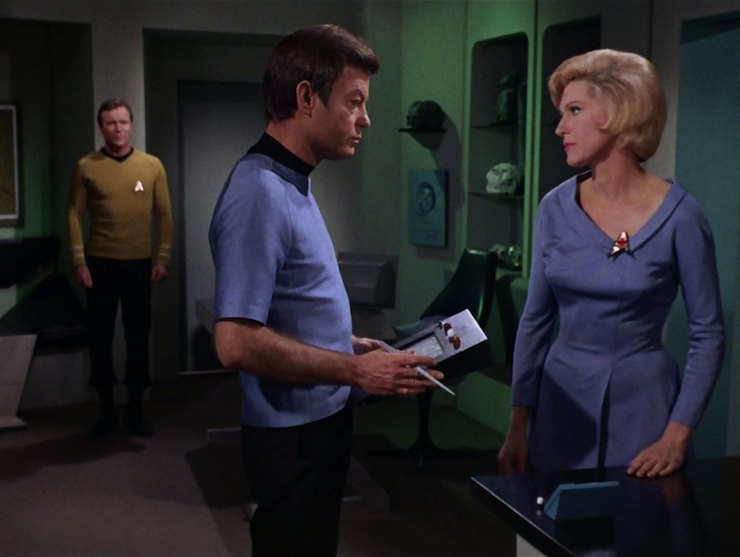
Trivial matters: The notion of a multigenerational “ark” ship goes back to the early twentieth century, and has been used in prose stories by Olaf Stapledon, Don Wilcox, Harlan Ellison, and Robert A. Heinlein, among many many others, as well as in comics (a Fantastic Four comic by John Byrne) and television (The Starlost, Doctor Who). The notion would also be seen in the TOS novel The Galactic Whirlpool by David Gerrold and in the Starfleet Corps of Engineers novella Orphans by Kevin Killiany.
The Mirror Universe novel The Sorrows of Empire by David Mack establishes that the alternate McCoy from the MU of “Mirror, Mirror” died of xenopolycythemia, as the I.S.S. Enterprise never encountered Yonada.
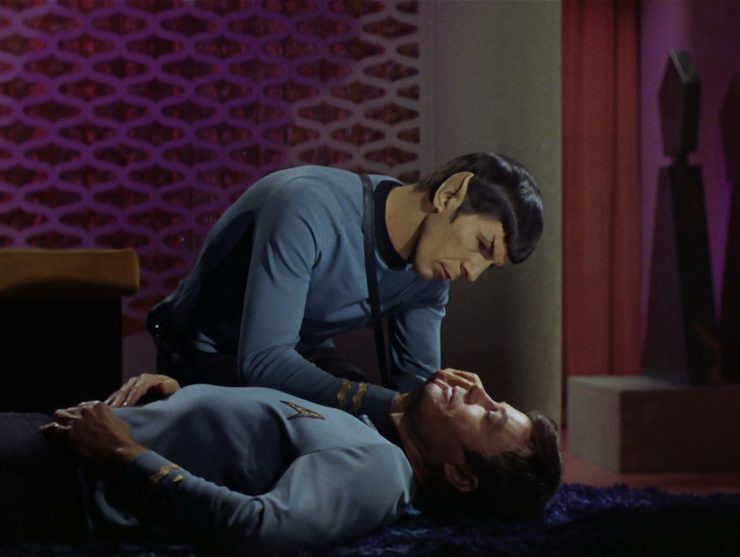
The novelization of Star Trek: The Motion Picture by Gene Roddenberry established that McCoy’s time in civilian retirement between the end of the five-year mission and the first movie was spent researching Fabrini medical technology. This was expanded on by J.M. Dillard in her novel The Lost Years, which filled in that gap in more detail.
Regular rewatch commenter Christopher L. Bennett revisited the Fabrini in a post-The Motion Picture time frame in his novel Ex Machina.
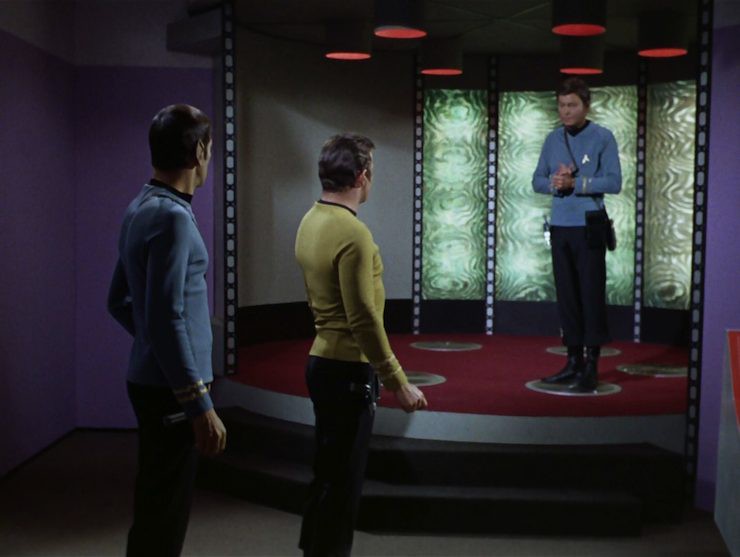
This is the only Trek script by Rik Vollaerts, a hugely prolific television writer of the 1950s and 1960s. (He also penned “The Bookworm Turns”/”While Gotham City Burns” on the 1966 Batman.) It is also the longest title of any Trek episode ever.
To boldly go. “A lot can happen in a year.” This episode is an object lesson in why the execution of a story is far more important than an idea. Because the idea here is a strong one.
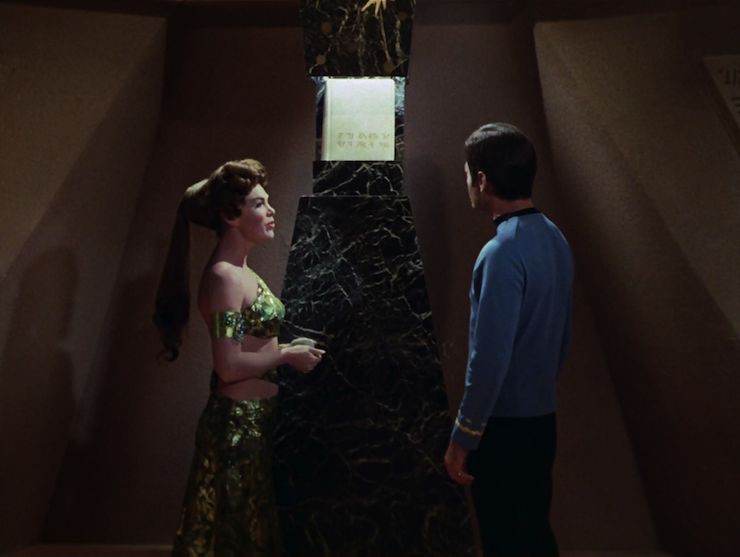
For starters, we have McCoy dealing with a terminal illness, which he’s approaching by avoiding any undue attention, preferring to keep it off the record, and when Chapel takes that choice away from him, to at least keep it under wraps. Then there’s the generation ship that isn’t aware that they’re in a ship. And there’s the love story between Natira and McCoy.
But it’s all a big mess in execution. Much like another Rik Vollaerts script I reviewed for this site, stuff happens without rhyme or reason or explanation or followup. The Yonada’s missile attack on the Enterprise is never explicated, nor even mentioned after Sulu blows the missiles up. It’s just there to create artificial suspense for the cold open. The Oracle’s heel turn from enemy to friend just happens without justification. Natira tells Kirk and Spock that they have free run of Yonada, but then they get in trouble when they enter the Oracle room even though they were never told they couldn’t. The admiral orders Kirk to go away, and then McCoy calls so they don’t have to go away (so why have the admiral call in the first place?).
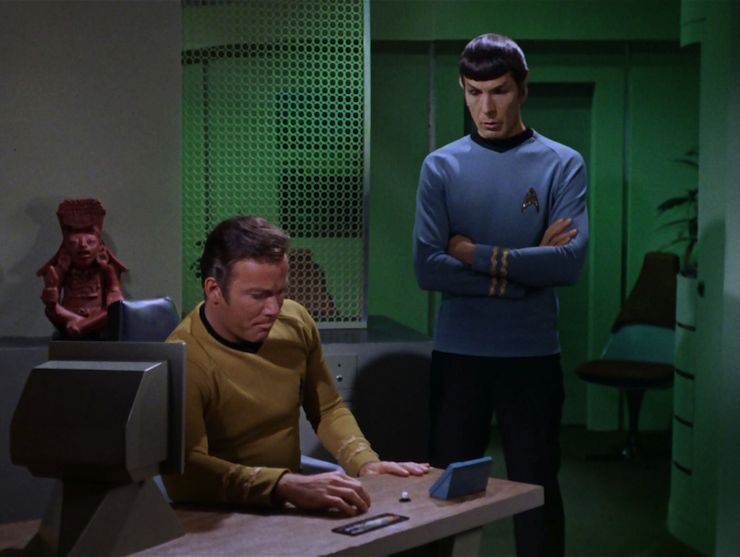
I’ve said in the past that love-story-in-an-hour episodes fall on the back of the guest actor, and this episode serves as a reminder that the talent of the actor is irrelevant if the script sucks. McCoy and Natira take one look at each other, spend all of half a second talking to each other, and it’s all hearts and flowers and I’ll spend the rest of my life with you, even if that’s only a year and I have to put an implant in my head. It just stretches credulity and makes the whole relationship absurd.
This script would have benefitted greatly by aping the structure of another third-season love-story-in-an-hour episode about a planetary collision, to wit, “The Paradise Syndrome.” (This despite the latter episode being inferior to this one.) The episode would have worked far better by taking more story time in the hour, giving McCoy and Natira’s relationship a chance to grow the way Kirk’s and Miramanee’s did, and have the Enterprise‘s efforts to get Yonada back on course take a certain amount of time and effort.
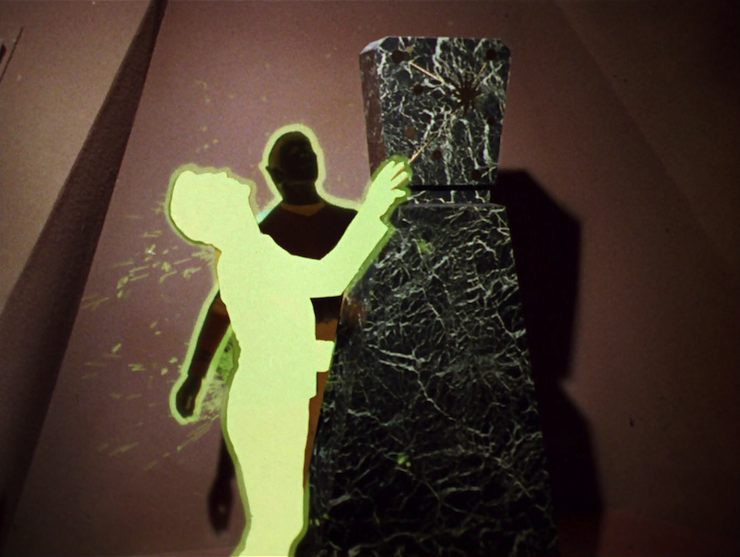
No one ever went wrong letting DeForest Kelley cut loose and be the focus, and it wouldn’t be the first time he was the saving grace of a bad script (as recently as “The Empath,” in fact), and Katherine Woodville makes Natira a worthy character, strong and impressive. But ultimately, this episode fails its premise.
Warp factor rating: 4
Next week: “Day of the Dove”
Keith R.A. DeCandido will be at Shore Leave 38 in Cockeysville, Maryland this weekend. Among other things, the convention will have the debut of Altered States of the Union, the alternate-U.S. anthology with Keith’s story “We Seceded Where Others Failed.” Other anthology contributors who will be guests at the con: Russ Colchamiro, Peter David, Michael Jan Friedman, Robert Greenberger, Glenn Hauman, Meredith Peruzzi, and Aaron Rosenberg. Other con guests include fellow Trek scribes Christopher L. Bennett, Paula M. Block, Greg Cox, Terry J. Erdmann, Dave Galanter, Jeffrey Lang, David Mack, Larry Nemecek, Marco Palmieri, Dayton Ward, Howard Weinstein, and many many others; fellow Stargate scribes Jo Graham and Melissa Scott; actors Karen Gillan, John Noble, Anthony Montgomery, Zoie Palmer, Michael Trucco, Anthony Lemke, Barbara Bouchet, and Michael Forrest; and tons more writers, artists, scientists, actors, and more. Keith’s full schedule is still being finalized, but he will be at Meet the Pros Friday night at 10pm signing and selling his books, performing with the Boogie Knights Saturday at 11am, and doing a practical self-defense workshop on Saturday afternoon. Keep an eye on his blog for the final schedule later this week.










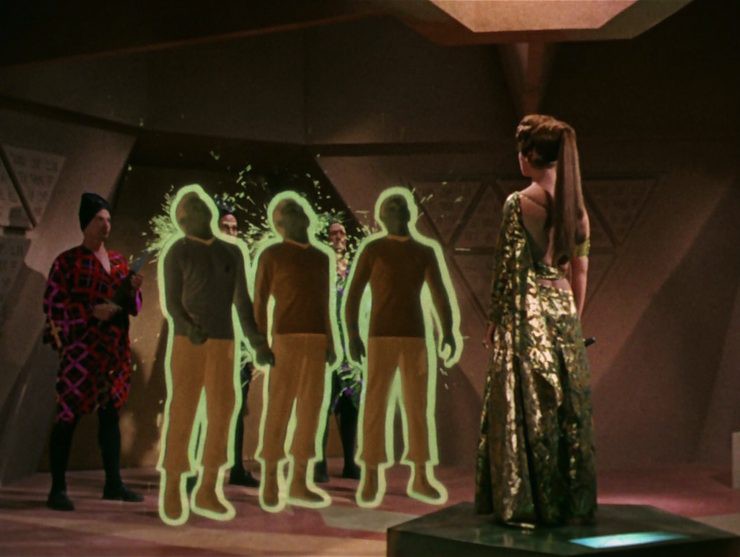

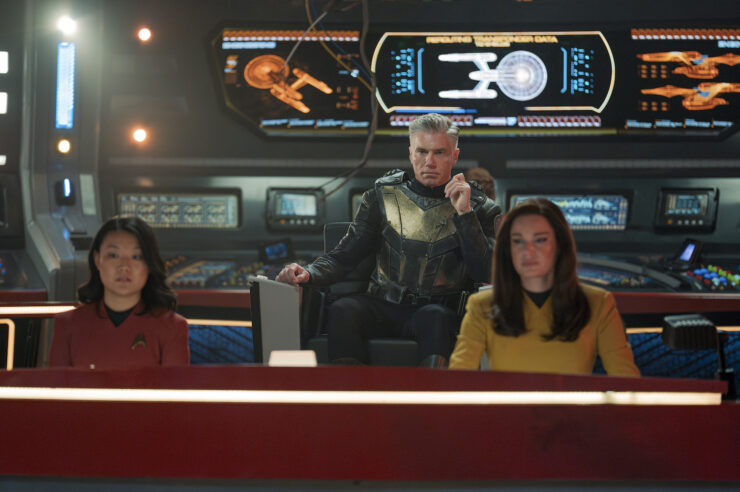
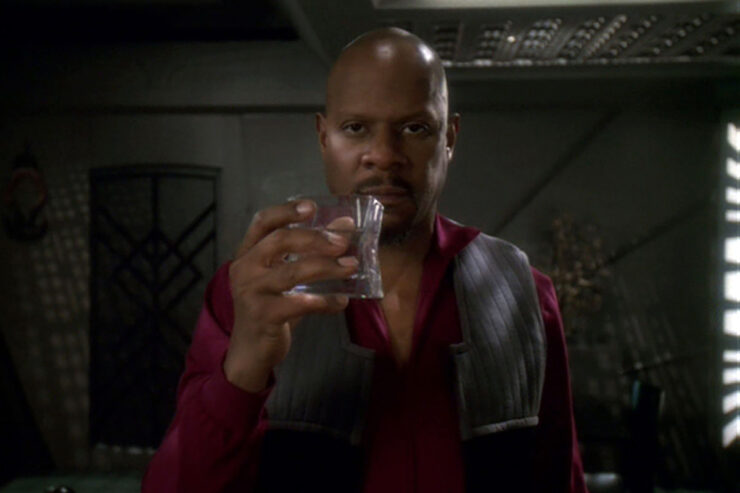
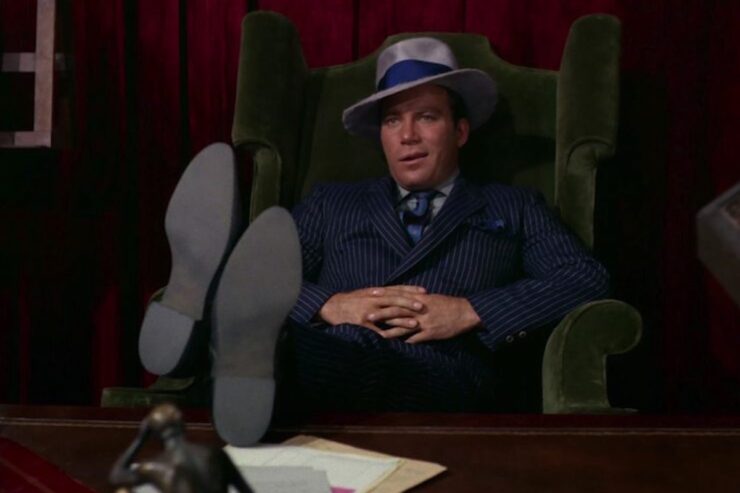
One of those corny episodes I have an unexplainable affection for. Maybe it has a little to do with the wonderful episode title; Say what you like about the episode, but it has the best title ever.
“This episode is an object lesson in why the execution of a story is far more important than an idea. Because the idea here is a strong one.”
Funny, I would have said the exact opposite. The episode starts out from two lame premises – give the hero a terminal illness as an incentive to change his life, and have a beautiful alien priestess fall in love with him immediately (because that’s what beautiful alien priestesses do, right?). And yet it works for me, and I’m quite fond of it.
Because it’s McCoy’s love story. Because everyone acts their part really well, which makes it all believable – Kirk and Spock being worried about McCoy, Natira being in love, and McCoy at everything he does. Because the generation ship where people don’t know that they’re on a ship, and the “sky” is actually rock, is nicely creepy. Because I like the design – Natira’s dress, the colourful attire of the Yonadans, the alien script (who invents all those alien scipts? This one looks completely different from the one in The Paradise Syndrome!). And because the story is about helping others, not just about getting out of trouble themselves, and I always like that.
Since you mention Ex Machina, that’s a great Star Trek novel, and I especially liked the history of Yonada established in it – that even in a society held in unnatural stasis by a computer, there has to be some change over the course of ten thousand years, and how the characters discover these changes bit by bit.
Does the Natira – McCoy relationship survive in the novels?
Yes, it’s all pretty contrived, but still a favorite of mine. Mainly because of the character interactions between McCoy, Spock and Kirk. The generation ship is a pretty good science fiction concept that hadn’t been done elsewhere in TOS. And coolest title ever.
This episode also has a great title. Every time I hear that title, I expect a bittersweet story about someone recognizing so much in their life has been hollow and that achievement (touching the sky) hasn’t brought what they wanted. And, every time, I get a story where the world is, uh, you know, hollow and the guy says he touched sky has . . . touched the sky. With his hand. Nonmetaphorically.
Honestly, any episode with that title and a terminally ill main character should be better.
There are a couple points I can let go. The could make it clear the Oracle hurt them badly as a warning of what happens to honored guests when they break the rules (and then state the rules). They could also come up with a somewhat better explanation why the Oracle seems to have outlived its warranty and is no longer operating up to code.
Still, this may be the first time they defeated an evil computer by accessing the manual rather than having Kirk talk it to death.
I agree about the title. The German title is “The lost planet”. I was enchanted when I read the original title for the first time.
@3/Porphyrogenitus: In Ex Machina, it gets rekindled, but in the end Natira leaves McCoy for political reaons – she’s a planetary leader, and she has to arbitrate between different factions, among them a strong anti-Federation group, so she can’t afford to have a Federation lover.
@5/Ellynne: In The Apple, they blow up the computer. I prefer talking them to death.
McCoy never again mentioning Natira after saying they would be together forever is the weakest part of the episode… though it’s not the episode’s fault.
Also, I’d like to share with you all that I’ve been invited to a pretty popular radio show in my city (in Spanish, though) today to talk about Star Trek’s 50 anniversary. If anyone speaks Spanish, or just wants to listen people talking about “Viaje a las Estrellas” in Spanish, listen online in about two hours here.
@6 – Jana: That German title sucks.
@7/lordmagnusen: “That German title sucks.”
Yep.
Will there be a recording of the radio show? I’d love to listen, but I’ll be asleep in two hours.
Even though my first published novel was a direct sequel to this episode (and an even more direct sequel to Star Trek: The Motion Picture), I actually don’t like this episode very much. It does have some interesting ideas that I felt were worth exploring, but it largely squanders them and is full of plot holes. Why is the nature of Yonada hidden from the people in the first place? How does Spock already know about the Fabrini? Who or what fired the missiles? Why in the world did Jon Lormer’s character insist on telling his story when he knew it would get him killed? (I tried to answer all these questions and more in Ex Machina, and making sense of Yonada’s history and culture was a driving factor in the plotting.)
And it’s all just so rushed and arbitrary. There’s a fistfight as soon as they arrive because there always had to be a fistfight somewhere in an episode, but for no other good reason. It happens and then it’s over. Then there’s the whirlwind romance, and there’s the guy who shows up only to die. McCoy gets married and implanted one minute and is getting the implant removed mere minutes later. And then at the end, McCoy tells Natira he has to leave to search for a cure for his disease, then Spock immediately walks out with a cure in hand — D’oh! And that negates McCoy’s entire excuse for leaving Natira, but he still leaves her!!
There’s also very little worldbuilding of Yonada’s culture, which I appreciated in writing Ex Machina, because it gave me enormous leeway for building a civilization based on the few tiny scraps of information we got. (Like how their outfits were so bright and garish because they were one of the only outlets for individual expression that they were permitted under the oppression of the Oracle’s thought control.) But as a viewer of the episode, it was disappointing.
It is DeForest Kelley and the luminous, classy Kate Woodville who make this episode work to the extent it does at all. It’s a shame such an effective relationship had to be so implausibly rushed, but this isn’t the last time that will happen this season.
@2/Jana: Thanks for your comments on Ex Machina. I really enjoyed working out Yonada’s history and the story of how its truths were gradually unearthed. I used a ton of what I learned from majoring in history in college, which is why the process of historical scholarship and study was so important to the narrative.
What would the literal German translation of the title be? I bet it’d be even longer…
“McCoy agrees to have the instrument of obedience (the subcutaneous implant) placed within him”
Sp, McCoy agrees of his own free will to have the implant inserted and the first thing Kirk & Spock do is remove it, followed up with the usual “We know what we’re doing more than anyone else does so what we say goes” speech. I mean the thing is called the Instrument of Obedience. It’s not like McCoy didn’t have the slightest idea what he was agreeing to. Unlike the Vulcans in Amok Time, at least the Fabrini give you some information to go on before you agree to something. Once again, It’s the Cosmic Mary Worths to the rescue. Can’t take the chance of people who don’t follow Federation ideals wandering the galaxy. We’re here to show them the error of their ways.
It’s always good to get an episode with more McCoy though. A character who’s willing to question things is always a breath of fresh air. Sure, Kirk has a couple moments of doubt but as Spock says in The Corbomite Maneuver
SPOCK: Has it occurred to you that there’s a certain inefficiency in constantly questioning me on things you’ve already made up your mind about?
KIRK: It gives me emotional security.
McCoy really has doubts as opposed to Kirk’s desire for confirmation. Of course, McCoy doesn’t really question things that much here but since he’s dying U’m willing to cut him some slack.
Agree about the title too. When I first heard it I though it’s a quote from some poem or something like that and was surprised to find out that it’s not. It sounds… well, big, I think, bigger than the episode itself.
I love the title, I like the bits about Kirk, Spock and McCoy dealing with McCoy’s illness, there are some great moments there. I have no problem with McCoy falling for Natira in about 5 minutes because I never thought it was much of a love story, more like desperation. He’s not only facing death but also most likely dying alone somewhere in a hospital (would a terminally ill person even be allowed to stay on a spaceship?), and instead he gets to play family and live a “normal” life with a woman he likes. Then him changing his mind once he knows he’s not dying is also making more sense.
But the rest of the episode has too many plot holes, some of them already mentioned… But the title saves it.
@11/Darr: That’s pretty much exactly how I justified the whirlwind romance (at least McCoy’s side of it) in Ex Machina — he was dying and afraid and he seized the opportunity for comfort that was offered to him. And once he had a future again and was able to get more perspective, he was suddenly in no rush to commit.
With a name like “For the World is Hollow and I Have Touched the Sky” you don’t even need the episode. Just run the closing credits after the title card.
I didn’t have a problem with the speed of McCoy’s romance. It’s got less than an hour to tell the story. After all, Kirk was ready to kill Flint over a woman that he’d met just a few hours beforehand . Spock and Zarabeth got along pretty well too (although he was apparently reverting to a pre-logical Vulcan at the time. I wonder why McCoy didn’t do something similar?)
How they fall in love isn’t as important as the fact that they do when you’ve on;y got 50 minutes to tell the rest of the story.
@14/kkozoriz: The brevity of the story is not an excuse for cutting corners. There are plenty of ways to compress time in a narrative, so there are plenty of ways to write a relationship that takes days or weeks to develop but is depicted in a matter of minutes. As Keith said, “The Paradise Syndrome” managed to fit a 2-month-long story into the exact same running time as this episode. Mission: Impossible‘s first-season classic “The Short Tail Spy” deftly handled a romance between Cinnamon Carter and a foreign agent through a montage that was structured like a single conversation spread across multiple short scenes of the characters doing recreational or romantic things together, so that a courtship of several days was plausibly and creatively developed over just four minutes of screen time. That’s an example of excellent writing and editing. Forcing a relationship to form in mere minutes for the characters because you only have a few minutes to present it to the audience is weak writing, not knowing how to make good use of time.
Heck, it would’ve helped a lot just to change the order of the scenes slightly, putting the scene of Kirk and Spock looking around Yonada before the scene where Natira tells McCoy how she feels, instead of having that proceed directly from the scene where Kirk and Spock leave. Just that simple transposition would’ve improved things by suggesting that McCoy and Natira had a much longer conversation before getting to that point. A couple of more very slight tweaks could’ve established that Kirk and Spock had been searching for a day or two — just do an establishing shot and a short log entry, and maybe change Natira’s wardrobe and the setting for the proposal scene and afterward, and you can add considerable in-story time to the plot while adding only a few seconds to the presentation (which could’ve easily been made up by, say, shortening the totally pointless fistfight a bit).
In the case of “Requiem for Methuselah,” I was going to save this comment for that episode’s rewatch, but the logic problem with that episode could’ve been easily fixed just by changing the deadline from four hours to four days.
15. ChristopherLBennett – Sure, they could have changed things nut we’ve got what we’ve got. Much like RforM, one of our heroes falls in love in a matter of minutes. Heck, Spock felt it was necessary to perform psychic surgery on Kirk’s memories because his feelings were so strong. (too bad Kirk never found out about that. Might have been interesting to see that come out during his “I need my pain” speech in TFF.)
Makes me wonder if something similar happened between McCoy and his first wife. Met, fell in “love” and then realized he’d made a mistake and skedaddles across the galaxy to get away from her. Or her from him. A t least he didn’t leave Natira with child as far as we know. (Ex Machina notwithstanding).
@16/kkozoriz: I think it would be better to discuss Pegg’s statement in the thread about Sulu, don’t you? Let’s keep this one about “For the World is Hollow and I Have Touched the Sky and My, This Is an Awfully Long Title, Isn’t It, Though?”
I was not aware that there was such a thread. Edited my post and moved it there.
What I didn’t understand was how it was so easy for Spock to defeat the Oracle. It had already zapped Kirk and Spock twice. Why not zap them a third time? Why the roundabout heating attack? Did the Oracle run out of zap charges? Or was the zapper designed to stun only and the Oracle needed a different kind of attack in order to kill them? Why not zap first and heat second? In the end the Oracle came off as too vulnerable to be a credible enemy.
@9/Christopher: “What would the literal German translation of the title be? I bet it’d be even longer…”
Only a little bit. It would be something like “Denn die Welt ist hohl, und ich habe den Himmel berührt”. Although “hohl” doesn’t have the figurative meaning of “hollow”, so it would be clearer that it’s meant nonmetaphorically.
Those sword-wielder costumes … clearly they were enjoying their spa time when the Enterprise suddenly showed up.
@20: As far as I’m aware, “hohl” has a pretty similar figurative connotation to “hollow,” although “empty” might be even closer. The term that doesn’t translate as well (at least that’s my impression) is “Himmel,” because that could just as well mean “heaven” – something the English phrasing certainly doesn’t go for.
@22/Torvald_Nom: No, I don’t think it does, and I’m a native speaker. You would be understood if you used “hohl” figuratively, but it would sound wrong – the conventional term to use is “empty”. I mentioned this because of comment #5 – I don’t think anybody hearing that title in German would expect a bittersweet story about hollow achievements, it would mostly sound curious.
You’re right about “Himmel”, although I think in this context people would think of “sky” rather than “heaven”. But most probably they would just be baffled and go and watch the episode to find out what it’s all about.
I wasn’t that bothered by the swiftness of McCoy falling in love with Natira, because back in the 60s, you couldn’t want to have sex with someone without having a deep, meaningful commitment AND getting married. It’s why the old Flash Gordon movies had Ming the Merciless wanting to marry Dale. He might be cruel and well merciless, but he wouldn’t dream of having sex out of marriage. Today, McCoy could have seen Natira, wanted her and decided to stay with her people because he was dying and it looked like a good way to go out. It would have been more realistic and would have made his whole “yep found the cure, have to go back to my ship now honey” speech fit.
The rushed pace does work against the story in a lot of ways, but sexual mores dictated the whole “fall in love and get married in 16 seconds” part of the story.
Really great title though.
@24/percysowner: Even so, as I said, a very simple editing change could’ve given the impression that McCoy and Natira at least had a somewhat longer conversation before jumping to the proposal.
Eh. Never a fan of the”oh, one has a terminal disease but presto-majesto, we find the cure before the end of the show” episode.
As for romance? I hate one-shot romances because they’re contrived. Everyone knows that the hero will leave at the end of the show leaving the woman behind and never give her another thought. Yawn. Why bother? I remember watching old shows from the 1960s (like westerns) and the Romance of the Week made me want to throw something at the TV.
And one would think that Oracle would be sophisticated enough to know that the ship is off-course.
I do like a McCoy-centric show though. It has that going for it.
But really, did ANYONE doubt that McCoy would be magically cured and that he would sail off in the Enterprise leaving Natira behind? Borrrrinnnggg.
@24/percysowner: But Natira fell for McCoy just as quickly, and she wasn’t dying.
@26 What’s frustrating about watching this episode nowadays is that such rich premise and depth of concept would now most likely be spread out over a multi-episode story-arc, which just wasn’t feasible in the world of 1960’s television business.
In the novel “Provenance of Shadows” by David R. George III, it is established that McCoy’s attraction to Natira stems in part from the fact that she resembled a woman named Anne with whom he had a relationship in the alternate timeline that was created when he saved Edith Keeler in City on the Edge of Forever. In the novel, McCoy retains a buried memory of the events in the alternate timeline even after time resets. He ends up visiting a top secret facility to view “temporal archive” material (or something like that) with images and records from the alternate timeline, at which point the Natira/ Anne resemblance becomes known to him.
@28/Russell H: And it wasn’t desirable in 1960s television either. People watched TV differently then. They didn’t have home video or streaming video binges or online show-guide wikis to give them a holistic view of a TV series. Early on, they didn’t even have reruns as a regular thing. If they missed an episode, they might not see it for years, if ever. And they’d have few chances to revisit old episodes and remind themselves of their contents. So there was less focus on building a continuous whole and more emphasis on making each individual installment a complete experience in itself.
More, there was a cultural difference involved. Today, we see serialized storytelling as smarter and more sophisticated and episodic storytelling as simple and shallow. But in the ’50s and ’60s, it was the other way around. The classiest shows in early TV were the anthologies, the showcases that would put on a different play every week, either adapted from great theater or originally written by respected playwrights like Paddy Chayefsky, Norman Corwin, Reginald Rose, and Rod Serling. Whereas serialization was more associated with cheesy daytime soap operas and kids’ adventure shows on radio. So the attitude was that if you wanted to write smart, sophisticated, highbrow TV that the critics would respect, either you made an anthology show, or you made an ongoing series that was designed to be as anthology-like as possible — a ship goes to a different planet every week, a fugitive goes to a different town and gets caught up in different people’s problems every week, a detective takes on a different case every week, a team of spies role-plays as different people every week, etc. The latter approach let you combine the advantages of a continuing cast (for audience loyalty to their favorite actors) and standing sets (to save money) with the dramatic and critical advantages of anthology-style writing. Often there was a deliberate lack of continuity from one episode to another — say, the Mission: Impossible team might expose their faces on national television one week yet still be perfectly anonymous the next. It was more like a collection of independent stories using the same characters and premise than a unified ongoing narrative.
But since we tend to experience TV shows in a much more holistic way these days, seeing each part as a portion of a larger whole rather than a complete experience in itself, we’re less forgiving if a story has no long-term ramifications. Still, serialization has its own weaknesses. Too many TV writers use it as an excuse not to worry about making each installment fulfilling on its own, since they know we’ll be back for more just to see how the storyline advances. Or they use it as an excuse not to come up with satisfactory resolutions for anything because they can just stretch things out in a perpetual second act, all questions and no answers. Personally, I think the optimum is in the middle — making each episode complete but having their ramifications affect what comes later, like how TNG and DS9 did it. I like it when serialization is an added layer on top of the episodic stories, rather than the entire thrust of the narrative.
@30/Christopher: I couldn’t agree more!
A great standalone episode is like a poem or a short story. If everything is one big tale, “The City on the Edge of Forever” or “The Inner Light” don’t get made any more, and that’s a loss.
@31/Jana: A good illustration of this, I think, is Supergirl‘s “For the Girl Who Has Everything,” an adaptation of Alan Moore’s classic Superman/Batman/Wonder Woman story “For the Man Who Has Everything.” The episode had to serve so many different ongoing plot arcs from the rest of the season that it was able to devote relatively little time to the actual adaptation, and so the version we got was fairly superficial and disappointing.
I’m just popping in to say that CLB’s Ex Machina is the best Star Trek novel I’ve ever read, and I’ve read all the TOS ones. He not only nailed the characters and universe, but expanded upon them in well thought out and and thought-provoking ways.
@33/Kate: Thanks so much!
In retrospect, it’s interesting to see that season 3 could and should have been a lot better than it turned out. There were plenty of promising episodes with interesting ideas. This was one of them. The idea of a worldship is a fascinating one. McCoy romancing Natira given the circunstances seems legit. And they share a surprising amount of chemistry. Most of this episode’s credit goes to the romance, for once, and also to Kelley’s ability to carry much of the hour by himself. Although I feel Paradise Syndrome did this much better.
Sadly, there are too many holes and leaps of logic. It never really comes together. I never liked the sci-fi concept of ancient beings building amazing machines and leaving them behind. Don’t they realize everything breaks down over time? And there’s something about the direction that bothers me. Leader frames the scenes, giving the impression that this is a very small place to live. I don’t buy it for a second that these people wouldn’t have figured out the artificiality behind their continued existence.
This really had the potential to be a great hour. The title alone implies something sublime.
I felt that the romance worked better here than in The Paradise Syndrome because Kirk wasn’t in his right mind, We got blank slate Kirk romancing Miramanne where as here we get McCoy, in a rough place but still essentially the same person. Kirk’s situation was more of a “what if” whereas McCoy was more of an “is”. Sure, it happened in the blink of an eye but it’s not like that was out of the norm. A friend of mine went on a blind date, had him stay the night and he moved in the next day. Unusual? Sure but it can happen. And much like McCoy, it didn’t last but my friend was married to him for 5 years. There was obviously something there, regardless of the speed of the relationship.
Just because I cannot find absolute proof on the interwebs, and we have geniuses here, the title really did originate from this episode, right? There’s no poem or something?
@37/MeredithP: Yep, as far as I’m aware, it’s from the episode. I have the ’90s version of the Concordance where every episode had the origin/meaning of its title listed, and this one just lists the scene from the episode itself.
I enjoyed Kate Woodville’s performance very much. Plus, it appears she goes to the same hairstylist as does Octavia, the Minstrel’s moll on Batman.
@8 – Jana: Yes, there’ll be a recording uploaded. :) Thanks for your interest. I didn’t get to say as much as I wanted, but I think it came out nicely. Do you speak Spanish?
It’s perfectly possible to do a romance-in-an-hour episode convincingly. Just sticking with TOS, “The City on the Edge of Forever” did a magnificent job of it. This one didn’t, and it was only even watchable because of Kelley and Woodville.
—Keith R.A. DeCandido
Season Three seems to be a real slog for you, much moreso than it was for me. I came to TOS only recently, having been raised on TNG and DS9. I can’t see TOS as anything other than dated camp, but I try to understand what it must have meant for fans back in the pre-TNG days to have this as the one and only (maybe TAS) series to follow.
I personally enjoy most of Season Three TOS. I recognize that it’s not as good as the first two seasons, and that it tends to fall back on the same kinds of genre/episodic cliches (one-shot love affairs, planet/alien of the week to blow up). But because of my lifelong association of TOS with camp, all I really care about is A) the actors are trying and B) it looks nice. And, like most TOS episodes, FtWiHaIHTtS looks magnificent to my eyes. And I personally love McCoy, probably easily more than the writers did. So any episode that gives Kelley a little something to do is fine by me.
I wonder, 4/10 (plus your other comments, you’ve stressed before the number is the least important thing to you), do you still enjoy episodes like this one? Can you re-watch them once or twice a year and enjoy them? Or do you think A) they’re either not that good or B) they just pale in comparison to the REAL TOS episodes from earlier?
Looking ahead, “The Cloud Minders” is possibly my favorite episode of all Season Three TOS (though “Wink of an Eye” is close), both being episode I enjoy despite knowing full well they are flawed. I just don’t hold TOS to any “holy” standards, since I see it as enjoyable and stylish AT BEST. Maybe you feel differently.
I’m just wondering if you still like these sub-par episodes, of if you feel more disappointed or frustrated with them than anything.
There’s no one answer to that question. There are episodes that rank low that I nonetheless can still enjoy watching (“The Naked Time” springs to mind). I love “The Tholian Web,” and next Tuesday you’ll get to hear me wax rhapsodic about “Day of the Dove,” which is probably my second-most-watched TOS episode after “The Doomsday Machine.”
—Keith R.A. DeCandido
I am terribly shallow, but I love this episode based entirely on Natira. That hair, that dress, the way she manages to convey calm, quiet authority. The dress is one of the best examples of the Theiss Titilation Theory ever created. (http://tvtropes.org/pmwiki/pmwiki.php/Main/TheissTitillationTheory)
@40/lordmagnusen: Solamente un poquito, and I’m also pretty bad at listening comprehension. I understood maybe half of what you were saying, but it was fun to listen.
@42/Muthsarah: “planet/alien of the week to blow up” – I don’t think they ever do that in the third season. They kill the disembodied aliens in The Lights of Zetar, but for the most part, it’s a rather peaceful season.
To be fair, being from Europe, you’re probably used to listening to people from Spain, and my accent and dialect is a lot different if you’re not used to it. But you can pick up stuff like “Roddenberry”, “Spock”, “Scotty”, or “Sisko”. :)
@24,@25 etc. re short romances:
My late fiancee fell in love with me over the space of a weekend (a Star Trek convention, as it turned out, before I became a well-known performer). And I know of many couples who met through similar circumstances. Falling in love is not a process that necessarily takes weeks or months.
(Please note that as of this posting I have not finished reading the comments, and since this site inexplicably refuses to let us edit after posting, I must apologize in advance if anyone has tackled this in the last couple of days.)
BTW, when I was growing up and seeing Trek for the first time in the 70s, I assumed Joanne Linville (Romulan Commander whatsername) was Larry (MASH’s Frank Burns) Linville’s wife. Please tell me SOMEBODY else thought that!)
Also, as long as I’m here, what the hell time zone is this? Four hours ahead of EDT? It looks like the site is headquartered in the middle of the Atlantic Ocean!
@47/Lou – Not sure where you’re getting the time zone. This post went up at 3pm EDT yesterday, just like it says on the time stamp.
Edit: Additionally, you can edit your postings if you are a logged-in user.
My favourite characters have always Scotty and McCoy. I love how Natira basically ignored Kirk and Spock and went straight for Dr. McCoy. About time he got a lady.
@48 Meredith, how do know if (or how can I become) a “logged-in user”?
And maybe it’s working now, but the last couple of posts I made were set four hours east of EDT. Just sayin.
@50/Lou FW Israel: There should be a link “Join now!” below the comment field and above the captcha. If you click on it and follow the instructions there, you become a logged-in user. (I did that yesterday.)
This one rises above the usual 3rd Season dreck. Of course it all wraps up a little too conveniently, but enjoyable nonetheless. I’d give it a solid 7.
@51 Jana (and others?), I just tried doing this and gave up after five attempts. It simply WILL NOT register me.
In case anyone is interested, here’s the audio of my radio appearance.
Warning: Spanish Language. :)
Lou FW Israel: Have you tried switching browsers? I’m not registered here, but there are other sites where I find Chrome gets me in and Firefox won’t, and vice versa.
I rather like “For the Life of Me, I Don’t Know Why This Title is So Long.” It’s on the shoulders of DeForest Kelley and Katherine Woodville; their chemistry sells it for me. Yes, third season standards, blah blah, but it’s very sweet. The moments between McCoy and Kirk and Spock, the way Kelley conveys McCoy’s growing feelings of helplessness at his illness and joy at finding love with Natira, all make this one work for me. This one definitely would have been even better with the tweaks CLB mentioned earlier; I imagine a montage with Natira and McCoy would have been very tender and convincing. Still to me a decent episode.
@53/Lou FW Israel: This site has some problems – sometimes comments don’t get displayed. You could try again later, perhaps at the weekend when there’s less traffic.
Also, you’re right that there’s something off about the time stamps – at least for my comments, it’s always four hours later in the preview than in the posted version.
i think someone on this discussion with more talent than I has the ability to write a great poem that helps to answer why the old man told the Enterprise officers about his experience even though he knew he had the obedience chip and would die. This way we could retro that great title into something beyond disappointment that the great idea did not match the great execution.
@58 – My guess about the old man is going to die soon and he has been aching to tell someone about what he discovered and sees the Enterprise crew as his only chance to tell his story without hurting someone (because somehow he knows they do not have the obedience chip).
Though why the Oracle would allow the landing party to stay is beyond me, surely it is smart enough to know that they would likely blab the secret it is keeping by design or accident sometime.
“For the world is hollow and I have touched the sky” is a great title, and to my ears it sounds very much like a verse from Jubilate Agno (https://en.wikipedia.org/wiki/Jubilate_Agno), a poem written in the mid-18th century by Kit Smart during his confinement in a London lunatic asylum.
Almost all of the verses of Jubilate Agno start with “Let…” or “For…”, and deal with Smart’s fascination with nature, science, Biblical figures, language, music, etc. There is a definite madness to it, but some of the verses are quite charming: “For I will consider my Cat, Jeoffry” quoted in the Wikipedia article beautifully describes his cat. Other verses hint darkly at his own experience: “For the officers of the peace are at variance with me, and the watchman smites me with his staff.” The British composer Benjamin Britten set some of the verses to music for choir and organ in the 1940s, and the resulting cantata is imaginative and dramatic, for those with eclectic musical tastes.
With this poem in mind, it seems to me that Kit Smart’s own madness is mirrored in the old man (Jon Lormer), who was driven by some inexorable need to climb the mountains, and later to share what he knew with Kirk, Spock and McCoy even though it meant his own death. I wonder how he climbed the mountains in the first place. Might he have done it as a boy, perhaps before the Instrument of Obedience was implanted? Was he haunted all his life by the knowledge that everything the Yonadans believed was false, yet unable to tell anyone? That’s a curse worthy of Cassandra, and might explain why he spoke when he did.
That’s another problematical thing, though: How did the old man know these guys were someone he could tell? In general, how come the Yonadans were okay with the idea of visitors from space if they didn’t know they themselves were on a spaceship? That’s just one of the plot holes that jumped out at me in developing Ex Machina.
The Yonadans know that Kirk et al are from another world. Natira tells the Oracle, “Strangers have come to our world” and later asks, “For what reason do you visit this world?” But as McCoy points out, “These people don’t know they’re on a spaceship.”
Yonada must maintain diurnal cycles similar to the lost Fabrini homeworld. In addition to light in the daytime, it presumably projects a night sky as well. The Yonadans think they are on a normal planet, isolated by their lack of space flight technology, but are otherwise nonplussed to encounter visitors from outside. I imagine the Oracle uses the Instrument of Obedience to quell any interest in re-developing space flight, or any inquisitive behavior on the part of the Yonadans.
Only the old man knows that Yonada is not a world as the others believe it to be. While the other Yonadans accept that the landing party comes from outside their world, he alone seeks them out to ask, “Where is outside?” When Kirk says that outside is “up there, everywhere”, gesturing to the sky, the old man replies, “So they say also… but things are not as they teach us.” The old man is trying to understand the nature of the universe, having carried for most of his life the secret that the Oracle has been lying to them.
As least Natira wasn’t killed at the end like seems to happen a lot when a TV character suddenly falls in love.
@62/justinf: But that “So they say also” line is exactly the problem. As far as the old man knows, these visitors in strangely monotone clothes have just confirmed the party line about the nature of the world and the sky. So why would he think it would do any good to tell them otherwise, especially if they actually came from out there and thus had a better firsthand grasp of the nature of the cosmos than anyone on Yonada? The script basically just introduced and sacrificed this bit player as a plot device to demonstrate the Instruments of Obedience, without putting any thought into the character’s own motivations.
Here’s how I put it in Ex Machina:
Although there’s a possibility I overlooked there — if these “visitors from outside” were positing the same cosmology that he knew to be a lie, wouldn’t he have thought they were in on the lie? In which case, revealing that he knew the truth would’ve gotten him killed even without the I of O.
@64/ChristopherLBennett You do put your finger on the bit that I found unsatisfying. Was the old man disappointed to hear Kirk repeat the lies of the Oracle, or did he understand Kirk to mean there is a universe outside the rock walls of Yonada? I’m not really sure, and he died without saying. But perhaps the mere presence of strangers so clearly from somewhere else (based on their clothes, their speech, their equipment, their references to space travel) led him to suspect the latter is true.
A fun episode, made all the better by focusing on McCoy rather than Kirk, and by the chemistry between him and Natira. I do wish the pacing of their relationship were better, and that there were more hints about the medical skills of the Yonadi (whoops, not Yonadans) to make McCoy’s cure more plausible. Maybe if the old man’s medicine had had an unusually salutory effect on McCoy’s health, and if there were some other hints at their skills, the resolution of McCoy’s health issues (which takes less than 50 seconds of screen time) would have seemed more organic and less perfunctory.
How strange to have two third-season episodes in which the Enterprise retreats before a large asteroid on an impact course with a populated planet. I wonder if this script or “The Paradise Syndrome” was chosen largely to allow re-use of the asteroid effects shot?
@65: I wouldn’t be surprised if they tweaked the script to make Yonada look like an asteroid instead of a recognizably artificial worldship.
I think the old man told them simply because they were outsiders. He wanted to tell the truth to someone before he died, and he knew that it was pointless to tell it to any of his fellow Yonadans, but here he saw at least a chance that it might do some good. When he came to their room, he had already decided to take the risk and tell them, so he did even though their answers to his questions were not what he had hoped for. It may not be perfectly rational behaviour, but it makes sense to me.
They probably made Yoneda look like an asteroid so they could reuse the visual from The Paradise Syndrome and thus save some money.
Hey folks! The rewatch for “Day of the Dove” will go up Wednesday, as I’m behind a deadline eight ball…
—Keith R.A. DeCandido
Firefox failed me utterly. So did Opera.
@70/Lou FW Israel: At the bottom of this page there’s a “Contact” link. It leads to a web page where you’re given an email address to contact if you have a problem with the site. You could try that.
Now that Joe Menosky is onboard the new Trek series, he’s officially become one of the only writers to have worked on four different ST shows. I believe the only others are Rick Berman and André Bormanis (who technically didn’t write any TNG or DS9 entries, even though he was a science consultant on both).
That is pretty impressive, yes.
@69
krad, since Shore Leave was this past weekend also,I’m happily surprised you’re cranking one out this week at all!
….forgot to mention D.C. Fontana as another one who worked on four different Trek shows. She wrote for TOS, TNG, DS9 and showran the Animated Series.
Oh, yes, definitely Dorothy.
Star trek stay the best movie all the time
I always referred to the ep as “For the World is Hollow but I Have Touched a Thigh”.
By the way, I noticed nobody asked if anybody knew what xenopolycythemia was. Probably most of you dismissed it as a made-up disease. But actually, polycythemia is a very real thing. It basically means that the volume percentage of red blood cells (hematocrit) is elevated.
In the real world, polycythemia isn’t fatal. It can happen for a number of mundane reasons, such as right after donating blood plasma. (It makes sense. If your plasma volume goes down, but the red blood cells are concentrated and returned to the body, then by definition your hematocrit is going to rise.)
However, it can also be indicative of more serious conditions, such as hypoxic lung disease (e.g. COPD) or certain cancers (renal cell carcinoma, liver tumors, von Hippel-Lindau disease, etc.) But I’m sure that in Star Trek, they can cure all that.
My guess is that Rik just picked something that he figured most people wouldn’t be able to spell (you can’t look something up in the encyclopedia if you can’t spell it), and added the prefix “xeno-” to it because <sarcasm> the “X” in “xeno” makes it sound eXotic </sarcasm>
Anyway, I just thought I’d try to be a little informative. xD
@79/MSpears: Rather, because “xeno-” is a Greek prefix meaning strange or alien, the same root as in “xenophobia.” “Exotic” is derived from a different Greek root, exo-, meaning outside.
“Blackmail is such an ugly word. I prefer ‘extortion’. The ‘X’ makes it sound cool.”
— Bender Bending Rodriguez, Futurama
^Bender was quoting a M*A*S*H episode in those first two sentences, though.
but MSpears said ” the “X” in “xeno” makes it sound eXotic”, which is why I went with the Bender quote.
@80/CLB: “Rather, because “xeno-” is a Greek prefix meaning strange or alien, the same root as in “xenophobia.” “Exotic” is derived from a different Greek root, exo-, meaning outside.”
I know that. But even so, “xenopolycythemia” sounds like more of a symptom, not a disease in and of itself. Polycythemia is usually not fatal, except for polycythemia vera, which is a cancer of the bone marrow that can lead to clots and strokes, but I’m sure Federation medicine can cure that.
So the only way it would make sense to me – and I’m not a doctor, so I could be wrong – is that he has polycythemia due to an unknown cause. The unknown cause (whatever it is) is the disease that’s really killing him. (In this case, I’m using the strange definition of “xeno-“, and interpreting that to mean “unknown causes”. If they knew what was causing it, they could probably cure it.)
I still think that it’s more likely that Rik felt that most people outside the medical profession wouldn’t even know what polycythemia was (he’d probably be right about that) and added the “xeno-” prefix to it.
“Why is the nature of Yonada hidden from the people in the first place?”
Did anyone ever give an answer for this?
@85/cauldronofevil: I offered one explanation in my first Trek novel Ex Machina back in 2005.
>>>>@85/cauldronofevil: I offered one explanation in my first Trek novel Ex Machina back in 2005.
LOL! I thought you might have – which is why I spend 45 minutes digging it out of my garage last night!
I also dug out “Best Destiny” which might have some information about the Fabrini as well.
FWIW, I had fun reading this novel on every page! Great book! Thank you!
Something that really strike me coming back to this episode is how the franchise’s approach to the Prime Directive has changed so radically over the years. Kirk and Spock’s assertion that allowing the people of Yonada to experience social change is preferable to letting them be annihilated is a notion so alien to modern Trek they might as well be speaking another language. Were this episode to take place in a more contemporary series, you’d get a five-minute long condescending lecture from Picard or Janeway about how Yonada colony-dropping onto an inhabited world is merely the natural course of its inhabitants’ development, and how they don’t know what the consequences would be for not letting four billion people die in a fiery explosion, or that actually protecting the lives of their own citizens and the Yonadans is an unreasonable imposition of Federation values or some-such nonsense. (Sisko would simply go ahead and solve the problem, PD be damned, because he’s awesome like that).
Another of my favorite episodes. I’m just a sucker for women in positions of authority – and Deforest Kelly’s blue eyes.
@89/Devin Smith: Rather, Picard and co. would engage in a debate over whether it was morally right to save them, and then save them anyway. That’s what they did in “Pen Pals,” however much “Homeward” corrupted the notion later on.
Picard and company would divert Yonada because the threat facing Daran V is artificial in nature. The threats facing the planets in Pen Pals and Homeward were natural phenomenon.
If someone had diverted the Chicxulub asteroid, we wouldn’t be here but the dinosaurs might have evolved to take over, much like what we saw with the Voth. Should the Federation step in to prevent loss of life from all sorts of natural disasters? Planetquakes? Disease? Storms? Volcanos? What about self-inflicted conditions? Stop all wars? Put an end to slavery? What about the caste system of Bajor? Send in the troops to put an end to that?
All too often, Starfleet declares the PD in effect and then wanders off, looking for the next shiny thing that catches their attention.
Also, if a condition is self-imposed, there should be no interference. Who are we to determine the validity of a decision a species imposes on itself that has no effect on others?
If anyone here is famiar with classic point and click PC adventure games, that’s what this episode has always felt like to me. Not necessarily a particularly great one, but it seems to have that kind of formula if that makes any sense. As a Star Trek episode I think it’s pretty bland and predictable. The deus ex machina ending with McCoy’s disease is the episode’s weakest point by far for me. On the other hand, I really enjoyed the set design with regard to Yonada’s ‘surface’ and The Oracle room. And certainly the title and De Kelley’s performance were the very high point.
Actually, with regards to the set design, I found it very amusing when our heroes located the control room, Kirk says something like:
“It’s active and functional not too different from the Enterprise.”
Ya, no kidding! It’s more or less a recolored Enterprise set…
@krad/Fascinating:
I agree, it’s one if my favorite all time Spock/McCoy moments. We also see Spock’s deep concern for McCoy in “The Empath.” I love both those scenes.
@35/Eduardo Jencarelli:
I just think they were conditioned to believe it and not question it. As the current political climate has shown, it seems not too hard to convince people a lie is the truth.
Oof, that missile attack might be one of the most pointless openings I’ve seen for this series. Another episode that at least doesn’t feel too long though.
@92/kkozoriz: “If someone had diverted the Chicxulub asteroid, we wouldn’t be here but the dinosaurs might have evolved to take over, much like what we saw with the Voth.”
The Voth were cool. I fail to see the problem.
“Should the Federation step in to prevent loss of life from all sorts of natural disasters? Planetquakes? Disease? Storms? Volcanos? What about self-inflicted conditions? Stop all wars? Put an end to slavery? What about the caste system of Bajor? Send in the troops to put an end to that?”
Decide on a case-by-case basis. When it comes to minimising suffering, one size almost never fits all.
Even with a case by case basis, you need some sort of guidelines. Captain A could decide that a planet wide system of inoculations, water treatment plants and sanitary sewer systems are appropriate measures in response to a plague while Captain B will only get involved in world wide situations such as war or disease where the casualty rate is likely to exceed 50%.
If the Federation had discovered Earth a few thousand years earlier, we could have had a situation where they stop all conflict between nations. Sure, we wouldn’t have had wars between countries but what about civil wars? Humans would come to expect the beings from the sky to come solve all their problems. Drought? You’re at the mercy of your neighbours who are unaffected. Disease? Close the borders and let everyone in the affected area die.
When you’re making the Federation responsible for ensuring thee’s no major loss of life, the Federation has to realize that they’re in it for the long haul. Right now, they show, solve one problem and then bugger off.
@96/kkozoriz: The Enterprise buggers off, the Federation stays, at least for a while. We know this from the times when Kirk leaves a crewmember behind or promises Federation help.
Although tie-in writers usually ignore it. I’ve lost count how many sequels to “A Piece of the Action” I’ve read where nobody visited the planet for years or decades after the Enterprise left. I think three or more.
Your hypothetical Earth scenario is the other extreme. I have the impression the Federation only interferes if there’s a reasonable chance of success, i.e. that people will be able to manage on their own soon. For example in “The Return of the Archons” there was already a resistance movement, they were just lacking a computer expert :)
@97 – In The Apple, the natives didn’t even know what sex was. They also didn’t understand death. They soon learned, all because the Enterprise couldn’t help deciding what was best for the natives.
@98/kkozoriz: Is this an argument for or against intervention?
Against, in the case of The Apple. There’s no evidence that the natives had their form of society forced upon them. They lives are fairly idyllic. They have no war. No disease. Then along comes Starfleet unbidden who take one look at the situation and say “This simply will not do at all.”
Similar situation with A Piece of the Action. The Iotians, of their own free will, decide to base the culture on a book left behind by a pre Prime Directive ship. Even though they made this decision for themselves with no coercion from outside forces, Kirk felt the need to change their society to something more to his liking. We’ll ignore for the moment that that meant turning it into a dictatorship with the Federation’s chosen man at the top, wielding all the power.
In the case of Patterns of Force, intervention is justified since the Federation sent a Nazi to be a cultural observer. If they didn’t know he was a Nazi they are still responsible for his actions. And was his belief that the Nazis almost got it right a new thing with Gill? Did he keep it secret during his time at the Academy? If he didm wouldn’t that mean that he knew it was wrong?
As I’ve said before, as soon as someone brings up the Prime Directive, you know somebody is going to violate it.
The Finale episode of Lower Decks too. After the Betans of Beta III went back to worshipping Landru, of their own free will, the lunatics on the Cerritos take it upon themselves to interfere again. That is the sort of rank colonial paternalism the PD is supposed to prevent. The situation with Kirk is muddier, but afterwards the Betans made an informed decision to return to the pre-Kirk state of affairs, and that is said to be a bad thing because they chose a path the characters didn’t like. That is the second worst interpretation of the PD in the entire franchise. And that is only because the pro-genocide episodes of Homewards exists and Dear Doctor was pre-PD.
I must point out though, in The Apple, Kirk and co only break Eden because the local mad computer was attacking the Enterprise. They beamed down for a bit of light scouting to solve a mystery and were happy to leave of their own accord when things got hot, but the local mad computer deity prevented them from leaving and was trying to destroy the Enterprise in orbit. That was why they killed it, had it not attacked them or not prevented them from leaving, then Eden would still exist in its happy, albeit rock-landmine strewn, state.
It isn’t a case of where they interfered because they got their morals in a snit.
Because Vaal detected a ship in orbit that had the power to destroy the entire planet as Kirk himself has boasted? The Enterprise poked it’s nose in where it wasn’t welcome and killed Vaal when it attempted to defend itself and it’s children.
Starfleet and the Federation feel that they have the right to go wherever they want to, regardless of how the inhabitants feel about it. They call it exploring. Everyone else calls it invading sovereign spaces.
See that might hold water if it wasn’t for Vaal preventing them fleeing. Kirk and co actively tried to leave when they found they were not wanted. As for exploring, that is Starfleet’s primary mission: To solve the mysteries of the universe, to make contact with peoples, and hopefully engage in peaceful dialogue. And a morally praiseworthy mission it is, otherwise we’re all going to be going back to shivering alone in the night. They tried the first two, but when the resident mad god prevented them leaving after they found the third to be not possible, they acted in self defence.
I just watched this one last night, and as per my childhood memories, basically enjoyed it, although I absolutely agree with Keith and Christopher that the story as a whole (and McCoy and Natira’s romance in particular) should have been played out in a much longer amount of time. Everything seemed so rushed. The worst aspect of this being the scene where Kirk and Spock beam back to the Enterprise, as far as they know bidding McCoy goodbye for the last time. The scene is played perfectly well by the three actors, but the script them very little to play–I get why Spock and McCoy might not be overly demonstrative with each other at this point, but McCoy is one of Kirk’s best and oldest friends, and we get very little from either Kirk or McCoy about how much the impending death affects them.
I just re-watched this episode. Thematically, this episode is similar to Return of the Archons and The Apple. All three deal with religions that have purposefully limited the personal freedom of their followers and stunted the technological development of their cultures. I wonder if the creators of these episodes were ant-religion in general or against only those religions that caused these types of stagnation?
@106/Paladin: As I understand it, Gene Roddenberry was skeptical of organized religion, of human institutions that used religion as an excuse to impose restrictions and assert power, but he was open to a more personal or abstract kind of spirituality.
Still, the thing to keep in mind is that these were alien religions, so shooting them down wouldn’t have been seen as a condemnation of all religion, just the “wrong” religions followed by foreign cultures. See Kirk’s reply to Apollo in “Who Mourns for Adonais” — “Mankind has no need for gods. We find the one [God] quite adequate.” Or the ending of “Bread and Circuses” with its attitude that the coming of Christianity to the Roman planet guarantees a happy ending for the planet. You can see similar attitudes toward non-Western religions in a lot of the fiction of the era, even to the point of painting them as primitive, dangerous cults. Showing Westernized heroes condemning or destroying a foreign culture’s cruel or warped religion isn’t necessarily an anti-religious statement, but is often implicitly or explicitly a pro-Christian statement.
@107/CLB: Good points.
Apparently, at least to Kirk, monotheism in general and Christianity specifically, is the defacto religion of humanity. Anything else is simply not correct. It’s strange that Roddenberry let that one slip past along with the sun/son bit from Bread and Circuses. But, it just shows that The Federation most likely does have an official religion since it is a human dominated organization. Hence Morrow’s dismissal of “Vulcan mysticism” among others.
Nice of him to speak on behalf of all mankind on something as personal as religion (or lack thereof).
TOS era Roddenberry was skeptical of religion. TNG era Roddenberry didn’t like religion because he didn’t want so much competition. ;-)
I love this episode, probably because I just love the idea of a society traveling through space on a ship without realizing they’re on a ship. The one thing that never made sense to me though was how the old man was able to literally touch the sky? Wouldn’t it have made sense to put more space between the mountains and the sky? There’s just no reason the old man should have been able to literally touch the sky (that is a really cool title though)
@111/Mary: My interpretation way back in Ex Machina was that Yonada wasn’t designed to fool its inhabitants; they originally knew they were in a generation ship, but the knowledge was lost over the millennia (which is the way it usually happens in generation-ship stories going back to Heinlein’s “Universe”). So the roof simulates a sky and the supports simulate mountains, but just for aesthetics, to capture the feel of living on a planet, rather than to deceive the inhabitants.
@10 Well, here the “people who don’t follow Federation ideals wandering the galaxy” were on course to destroy an entire world and presumably themselves. This was due to their culture of total ignorance of their reality, so yes, they absolutely needed to be shown the error of their ways.
Pretty much totally agree with the review. The premise of the generation ship is very good, but the execution is lousy, and many aspects of the plot do not bear scrutiny. I guess it’s a good thing the asteroid shot at them, otherwise they might have nudged it’s course so that it fell into a star.
@113/Michael Booth: “otherwise they might have nudged it’s course so that it fell into a star.”
That would be far more trouble than it’s worth. Putting things on trajectories to fall into stars is much, much harder than fiction generally portrays it, because stars are proportionally tiny targets relative to space as a whole, and objects in space tend to move very fast, so it would take a hell of a lot of delta-v to change their course and speed to precisely the right degree to hit such a distant target in just the right way to fall in. If you’re even the slightest bit off in your calculations, it’ll probably go into orbit or a grazing parabolic/hyperbolic trajectory rather than actually falling into the star.
And it’s so unnecessary, because it’s called “space” for a reason. Most of it is incredibly empty, and the odds of anything moving through space hitting another body are extremely, extremely low. So all you have to do is nudge something slightly, enough to miss the planet, and it’ll probably pose no more danger to any other planet for the foreseeable future. There are countless asteroids and comets whizzing around space already, so one more isn’t such an unmanageable threat that it would have to be destroyed.
I don’t think this was a terrible episode as it had some nice moments like Spock comforting the weakened McCoy — but I just didn’t buy the Natira-McCoy “love story” at all. It was nice to see McCoy get with a woman for a change, but it seemed like Natira dictated that whole relationship: she saw McCoy, was instantly attracted to him and asked him to stay on Yonada as her mate (all in about two minutes!). McCoy just went along with it no questions asked! And the terminal illness McCoy had which the Fabrini just happened to have a cure for? Hoo boy, what a contrived plotline!
@115/Palash: “And the terminal illness McCoy had which the Fabrini just happened to have a cure for? Hoo boy, what a contrived plotline!”
Well, the Fabrini didn’t “just happen” to have a cure for that specific disease, but had very advanced medical science with cures for many diseases, including that one. A lucky happenstance, but not quite that contrived.
When I was a child I thought the Oracle (or at least his voice was very scary). Later, when I found out the Oracle was voiced by James Doohan, my fear abated. Then, I thought it would be hilarious if the Oracle sounded like our friendly Scotsman! (“Ah, Natira, you’ll have ta kill the strangers! They know too much about Yonada, lass!”)
Posting from the future. Just wanted to say the discussion around this episode here inspired me to start reading Mr. Bennett’s book, Ex Machina. I’m about halfway through and I don’t think I’ve ever seen anyone capture TOS characters in print so well. Almost makes me want to write my own Trek fic.